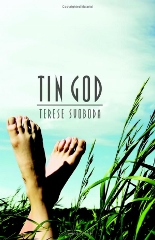A Godly Pretense
Author: Terese Svoboda
 There’s something truly fun about an author who is willing to tell their story from the POV of God. Not with hubris or preaching or science fiction, but with a real attempt to make you feel the presence of an actual being both unlike ourselves and so much like us that it understands our everything. I like the leap of faith it takes to attempt such a story. The product of that leap is Tin God by Terese Svoboda.
There’s something truly fun about an author who is willing to tell their story from the POV of God. Not with hubris or preaching or science fiction, but with a real attempt to make you feel the presence of an actual being both unlike ourselves and so much like us that it understands our everything. I like the leap of faith it takes to attempt such a story. The product of that leap is Tin God by Terese Svoboda.
Tin God tells two stories separated in time but held together by place. The first is of a Spanish conquistador separated from his comrades and lost in the tall grasses of the Great Plains. The natives know he is there – they saw him get thrown by his horse – and think he might be a god because of his shining armor, especially his helmet. They follow him, silently, as he fumbles his way through the never ending grass, surrounded
by the soft, maddening whisperings of people, wind, and blade on blade. God has a human incarnate present in this story, but he looks on from afar.
The second story brings us into the present where those tall grasses have been replaced by farm fields and men with less than honorable intentions. In this time our narrator is physically present, interacting with the men, hidden among the ordinary.
The two stories sort of wind together eventually but for most of the book they feel disconnected – the location doesn’t even feel similar enough to tie the two together. Certainly the stories themselves feel not at all alike – not even on a basic thematic level. It is here where Tin God falters for the first time. The only things linking the two stories are inconsequential and revealed too late to make the book have any cohesion. God is present in both, but not in a way that binds the narratives. There’s also the problem of the narratives themselves. Each is but a thin shell – not particularly interesting or developed, simply the kernel of a story presented as if it were whole. And then there is God. Presented in more of a Mother Nature way than anything else, this God watches and reports and occasionally discusses how grand she is but rarely has anything of particular interest to add. Finally, there’s the maddening gimmickry of failing to properly punctuate. I don’t know why people think that this is a form of art, but to me it’s only a nuisance that either confuses the narrative or is used as cover. In this case it’s a little of both. Dialogue is messy and hard to follow and it feels a lot like the author is telling us that God doesn’t need something so pedestrian as proper grammar. I think the effect is supposed to be arty. Sadly, it comes off as pretentious and sloppy.
I wanted to like this book – I like the idea behind it. I like the notion of God telling stories from a piece of land, hundreds of years apart but still rooted in the same soil. Unfortunately, the execution of the stories left me absolutely cold – I didn’t care about the characters, the descriptions of the land (while interesting at first in the earlier story) quickly became tedious and God felt a lot more like a pretense for thin stories and gimmicky writing than any honest attempt to examine the human condition. Tin God is a short book that felt like it lasted forever. I can’t possibly recommend it. 2 stars out of 5, the second only as a nod for an ambitious premise.
— S. Millinocket
Thanks to the University of Nebraska Press for sending me a review copy of this book.
photo by David Shankbone
- Crossing the Pressure Line with Laura Bird - April 1, 2022
- Fall Photo Contest Winner - November 20, 2014
- Gone Girl Movie Cast Poll: You Choose the Actors! - April 12, 2013


Leave A Comment